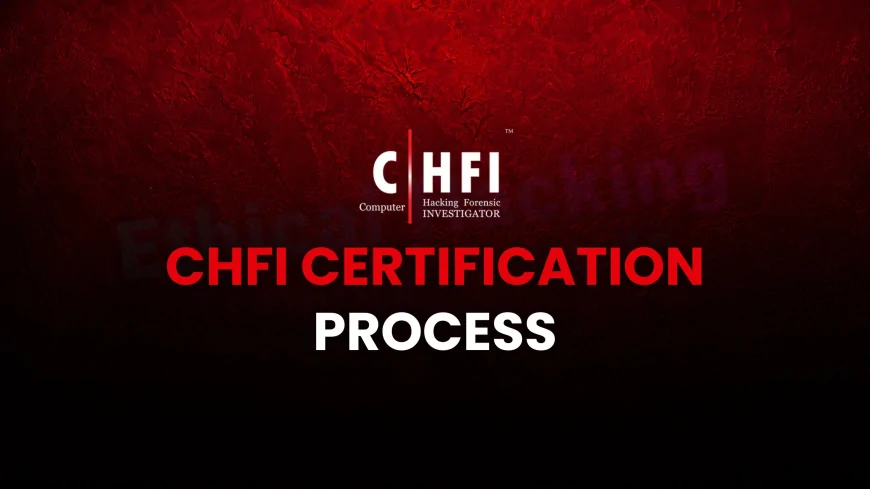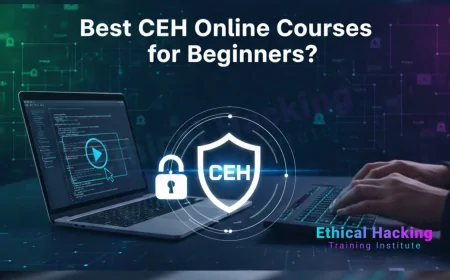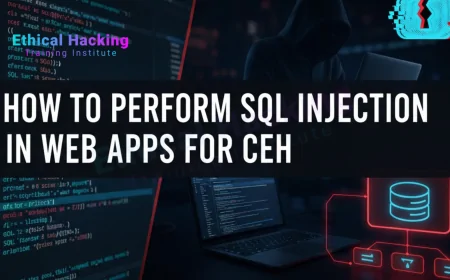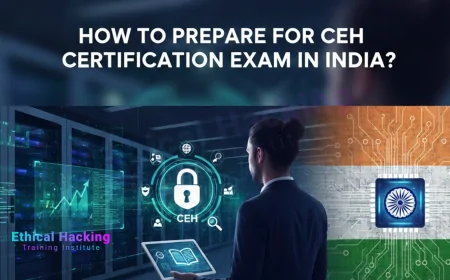How to Earn Your CHFI Certification: A Step-by-Step Guide | How to Get Certified as a CHFI: Everything You Need to Know
Learn how to earn your CHFI certification with this step-by-step guide. Includes training tips, exam prep, labs, resources, and career advice.

Table of Contents
- Introduction
- Why CHFI?
- Eligibility & Prerequisites
- Choosing a Training Path
- Design Your Study Plan
- Hands-On Lab Practice
- Recommended Study Resources
- Mock Exams & Prep Tests
- Exam Registration Process
- What to Expect on Exam Day
- Tips to Pass the CHFI Exam
- Post-Certification Next Steps
- Career and Salary Impact
- Certification Renewal & CPE
- Common Challenges & Pitfalls
- Success Stories
- Frequently Asked Questions
- Conclusion
Introduction
The CHFI (Computer Hacking Forensic Investigator) certification validates your expertise in digital forensics—recovering data, reconstructing cyber incidents, and presenting findings. This guide walks you through each step—from preparing to post-certification.
Why CHFI?
The CHFI (Computer Hacking Forensic Investigator) certification is more than just a credential—it’s a professional gateway into the world of digital crime investigation and cybersecurity response. Here’s why CHFI is worth pursuing:
1. Rising Demand for Digital Forensics Experts
With cyberattacks becoming more frequent and sophisticated, businesses and law enforcement agencies need trained professionals who can:
-
Investigate breaches
-
Recover deleted or hidden data
-
Present forensic evidence legally and ethically
CHFI-certified professionals meet this exact need.
2. Globally Recognized Certification
Issued by EC-Council, the same body behind the CEH (Certified Ethical Hacker), CHFI is trusted by:
-
Governments
-
Police and legal authorities
-
Multinational corporations
-
Financial institutions
-
Cybersecurity consulting firms
3. Master Critical Tools and Techniques
The CHFI program trains you in industry-standard forensic tools like:
-
EnCase
-
FTK
-
Autopsy
-
Volatility
-
Cellebrite
You'll also learn how to create disk images, trace malicious activities, and report findings that stand in court.
4. Career Advancement & Job Roles
A CHFI certification opens the door to high-paying roles like:
-
Digital Forensics Analyst
-
Incident Responder
-
Cybercrime Investigator
-
eDiscovery Expert
-
Malware Analyst
Salary Range (Global): $70,000–$120,000+
India: ₹6–15 LPA+
5. Bridges Technical and Legal Skills
Unlike many other certifications, CHFI combines:
-
Deep technical training
-
Understanding of legal processes, chain of custody, and evidence admissibility
This makes you a dual-skilled professional—valuable in cybersecurity and legal circles.
6. Boosts Your Cybersecurity Profile
Pair CHFI with CEH, CompTIA Security+, or OSCP and you become:
-
Well-rounded in offensive and defensive cyber practices
-
Qualified for senior DFIR (Digital Forensics & Incident Response) teams
-
Eligible for court testimony roles or expert witness positions
7. Hands-On, Real-World Learning
The CHFI curriculum is lab-intensive, meaning you don’t just memorize theory—you practice:
-
Live data recovery
-
Real breach investigation scenarios
-
Malware analysis
-
File system forensic reconstruction
Summary:
CHFI is ideal for those serious about investigating cybercrime, working with law enforcement, or building a forensic specialization within cybersecurity. It blends technical depth, legal relevance, and real-world value—making it a smart career move in 2025 and beyond.
Eligibility & Prerequisites
Though open to all, it’s best if you have:
- Basic to intermediate IT and networking knowledge
- Experience with operating systems and storage systems
- Familiarity with Linux and Windows forensic concepts
Choosing a Training Path
You can prepare through:
- Self-paced online: Video modules + lab access
- Instructor-led virtual: Live sessions and Q&A
- On-site bootcamp: Intensive multi-day training
- Corporate cohorts: Office-based, team-based learning
Design Your Study Plan
- Break down exam domains weekly
1. Forensic methodology
2. Evidence collection
3. Operating system forensics
4. Network & mobile forensics
5. Reporting and legal compliance - Add buffer weeks for lab practice and mock tests.
- Schedule regular review and rest days.
Hands-On Lab Practice
Use virtual labs to:
- Create disk images and forensic copies
- Analyze registry, memory dumps (Volatility, FTK)
- Parse network logs, recover deleted files
- Document chain-of-custody and build reports
Recommended Study Resources
- EC-Council official CHFI kit
- Books: “Incident Response & Computer Forensics” by Bunting
- Hands-on blogs, webinars forums (DFIR Reddit, BleepingComputer)
- Practice tools: Autopsy, X-Ways, EnCase Imager, Cellebrite UFED
Mock Exams & Prep Tests
Simulate conditions with:
- 200-question mock exams
- Review wrong answers and revisit those topics
- Timed exams to improve time management
Exam Registration Process
- Create EC-Council iClass account
- Purchase voucher or course bundle
- Schedule proctored exam (in-person or online)
- Accept candidate agreement and exam rules
What to Expect on Exam Day
- 4-hour, 150 MCQs covering all domains
- Proctored environment—check-ID, webcam etc.
- Read each question carefully—no negative marking
Tips to Pass the CHFI Exam
- Understand terminology—image, hash, artifact, chain-of-custody
- Group-study obscure topics (e.g., mobile, IoT forensics)
- Practice forensic write-ups under time pressure
- Take short breaks during exam for focus
Post-Certification Next Steps
- Update LinkedIn, resume, professional networks
- Join DFIR communities and mailing lists
- Apply for roles: forensic analyst, incident responder
Career and Salary Impact
CHFI holders earn ₹6–15 LPA in India, and $70K–$120K globally, working in pen-testing, DFIR teams, consulting.
Certification Renewal & CPE
- CHFI valid for 3 years
- Earn CPE credits—events, writing, webinars—to renew.
Common Challenges & Pitfalls
- Avoid over-reliance on theory—labs are essential
- Don’t neglect legal/chain-of-custody topics
- Manage study-life balance to prevent burnout
Success Stories
“Passed CHFI in 8 weeks while working full-time—landed a role in a security team.” – Priya, Pune
“Bootcamp + labs gave me confidence to handle malware investigations.” – Vikram, Delhi
Frequently Asked Questions (FAQs)
1. What is the CHFI certification?
CHFI stands for Computer Hacking Forensic Investigator, an EC-Council credential validating digital forensics skills.
2. How long does it take to earn CHFI?
It varies: 5–7 day bootcamps or 8–12 week online formats with labs and study.
3. Do I need IT background?
Basic IT and networking knowledge is recommended but not mandatory.
4. Are labs required for CHFI?
Yes, practical lab work is essential for exam readiness and real-world application.
5. What tools are used?
Common tools: EnCase, FTK, Autopsy, Volatility, X-Ways, Cellebrite.
6. How much does CHFI cost?
Training varies from ₹80k–₹150k in India; exam voucher may be extra or bundled.
7. What is the exam format?
150 multiple-choice questions to be completed in 4 hours.
8. Is there negative marking?
No, CHFI does not penalize wrong answers, so attempt all questions.
9. Can I take exam online?
Yes, through EC-Council’s remote proctoring platform.
10. What is passing score?
Passing scores range between 60%–75%, depending on the exam version.
11. Is CHFI globally recognized?
Yes, many governments, law firms, and cybersecurity firms recognize CHFI.
12. How do I maintain certification?
Earn EC-Council CPE credits or retake the exam every 3 years.
13. What job roles are open?
You can work as forensic analyst, incident responder, eDiscovery specialist, or consultant.
14. What salary can I expect?
Average salary: ₹6–15 LPA (India); $70K–$120K globally, based on role and region.
15. Can beginners attempt CHFI?
Yes—with dedicated study and lab practice you can prepare successfully.
16. What are key exam topics?
Forensic methodology, OS, network, mobile forensics, evidence handling, legal aspects.
17. How to succeed in labs?
Practice regularly, follow step-by-step guidance, document and report findings clearly.
18. Is group study helpful?
Yes, peer discussions help clarify concepts and reinforce knowledge.
19. What if I fail the exam?
You can retake after 30 days; some training providers include a free retake.
20. What are next certifications?
Look into GCFA (GIAC), CFCE, OSCE for deep forensic and advanced incident response roles.
Conclusion
Earning CHFI certification is a journey involving planning, lab practice, exam strategy, and post-certification positioning. With structured training and dedication, you can join the elite ranks of digital forensic professionals and accelerate your cybersecurity career.
What's Your Reaction?
 Like
0
Like
0
 Dislike
0
Dislike
0
 Love
0
Love
0
 Funny
0
Funny
0
 Angry
0
Angry
0
 Sad
0
Sad
0
 Wow
0
Wow
0


















